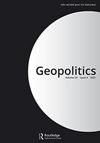地缘政治、瘫痪与卫生政策——兼论《代顿和平协定》对波斯尼亚和黑塞哥维那移植系统的影响
IF 3.4
1区 社会学
Q1 GEOGRAPHY
引用次数: 0
摘要
摘要《代顿和平协议》(DPA)签署25年多后,南斯拉夫及其后建立的基于种族分裂的独立国家的阴影仍然笼罩着波黑、波黑人口和人民的日常生活。其两个主要政治实体——波斯尼亚和黑塞哥维那联邦(FBiH)和塞族共和国(RS)——的建设反映在医疗保健系统中,在那里它产生了非常有害的影响。在这里,我们可以看到波黑建立有效器官捐献和移植系统的能力受到严重影响。这篇文章基于对患者、患者组织、临床医生和政治家波黑及其邻国的26次采访,将临床实践中的障碍、后代顿官僚作风以及不信任和腐败确定为我们的受访者所阐述的主要主题,最终使他们陷入后代顿瘫痪。在陷入僵局的结构条件下绝望,并考虑获得移植的替代方法,似乎是一个被广泛认为有缺陷的系统的合乎逻辑的结果。这体现了战争的平淡遗产和波黑政治行政系统的脆弱状态。本文章由计算机程序翻译,如有差异,请以英文原文为准。
Geopolitics, Paralysis and Health Policy: On the Implications of the Dayton Peace Accords for Bosnia & Herzegovina’s Transplantation System
ABSTRACT More than 25 years after Dayton Peace Accords (DPA), the shadows of the Yugoslav and of the subsequent construction of independent states based on ethnic division still looms over Bosnia & Hercegovina (BiH), its population, and the everyday life of people. The construction of its two major political entities – the Federation of Bosnia & Hercegovina (FBiH) and the Republika Srpska (RS) – is reflected in the health care system where it unfolds highly detrimental effects. Here, we can witness the severe impact on BiH’s ability to establish an effective system for organ donation and transplantation. Based on a series of 26 interviews with patients, patients’ organisations, clinicians and politicians BiH and its neighbours, the article identifies obstacles in clinical practices, post-Dayton bureaucracy as well as mistrust and corruption as major themes articulated by our respondents, ultimately imprisoning them in a Post-Dayton paralysis. Desperation amid the deadlocked structural conditions and contemplating alternatives ways of getting access to transplantation seem logical outcomes of a system widely regarded as deficient. This exemplifies the prosaic legacies of wars and the fragile state of BiH’s politico-administrative system.
求助全文
通过发布文献求助,成功后即可免费获取论文全文。
去求助
来源期刊

Geopolitics
Multiple-
CiteScore
7.60
自引率
10.30%
发文量
50
期刊介绍:
The study of geopolitics has undergone a major renaissance during the past decade. Addressing a gap in the published periodical literature, this journal seeks to explore the theoretical implications of contemporary geopolitics and geopolitical change with particular reference to territorial problems and issues of state sovereignty . Multidisciplinary in its scope, Geopolitics includes all aspects of the social sciences with particular emphasis on political geography, international relations, the territorial aspects of political science and international law. The journal seeks to maintain a healthy balance between systemic and regional analysis.
 求助内容:
求助内容: 应助结果提醒方式:
应助结果提醒方式:


